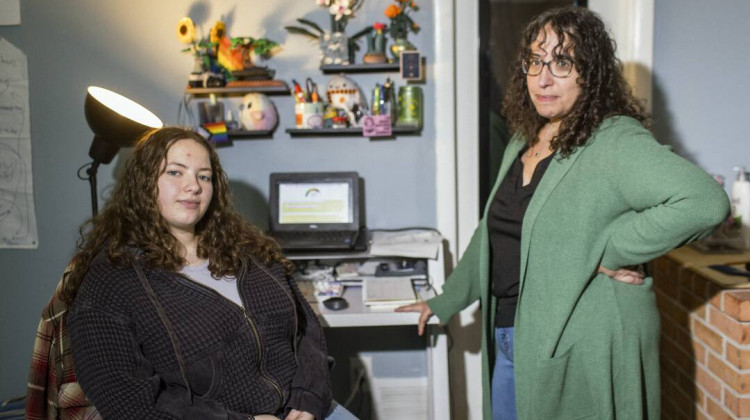
Schools are offering pay raises to attract qualified substitutes teachers at a time when many are struggling to cover open staff positions.
RODNAE Productions/PexelsThis story was originally published by Chalkbeat. Sign up for their newsletters at chalkbeat.org/newsletters
Facing a shrinking pool of substitute teachers, a few school districts in Indiana have announced major pay raises to entice subs with teaching experience back to the classroom.
Last month, Elkhart Community Schools announced a $350 full day rate for teachers who have retired from the district, as well as $300 for all other retired teachers, up from $145 last year.
And Muncie Community Schools announced it will double the daily rate for substitute teachers who have teaching licenses, experience in the classroom, or at least a master’s in education from $105 per day to $210 per day.
They hope to attract qualified teachers at a time when many schools are struggling to cover open staff positions — a complicated problem with roots in the declining number of new teachers in the state.
But the strategy could also pit districts against each other in the race to hire subs, while potentially reducing money available for staff raises.
“You can go through rural areas and on the same highway see three different school districts in 30 minutes. If you’re getting calls on Tuesday night to substitute on Wednesday, it’ll affect your choice of where you’ll go,” said Keith Gambill, president of the Indiana State Teachers Association.
Gambill said that when he started teaching in 1987, there were often more new teaching graduates than open positions. But recent statistics indicate that the labor environment for teachers has changed dramatically.
Indiana Department of Education data from June shows a downward trend in the number of teachers entering the profession over the last decade — from around 6,000 in 2014 to just over 4,000 in 2020 — as well as an uptick in teachers leaving the job.
The same report showed that from 2012 to 2021, the public school teaching force grew by 654 teachers overall.
There are currently over 1,500 open teaching positions on the department’s job bank, plus 35 open substitute positions. But there is no comparable data for past years, making quantifying a shortage difficult, especially since some schools may cancel or merge classes if they can’t find a teacher, Gambill noted.
“With fewer candidates in the profession, everyone who graduates is getting jobs,” Gambill said. And with respect to substitutes, he added, “We’re also relying on retired folks who aren’t prepared to go back into an atmosphere where COVID still exists.”
Some retirees may also be reluctant to return as subs due to their unfamiliarity with classroom technology’s growing footprint in schools, especially during the COVID years, Gambill said.
In Muncie, schools saw the number of substitutes shrink by 10% from last year, and 30% from before COVID, according to the district.
District CEO Lee Ann Kwiatkowski said the declines are partly due to fears of the virus, and partly due to trends in the larger labor market. Overall, the situation left schools to ask instructional aides, library aides, and school counselors to cover for absent teachers.
“We had building principals covering classrooms,” she said.
Targeting raises to former and retired teachers allows Muncie schools to hire the best possible candidates for the classroom, said Kwiatkowski, and thus avoid learning disruptions when a staff teacher is unavailable.
In the week after the raises were approved by the Muncie school board, 13 candidates applied to substitute, citing the raise as a factor in their interest, Kwiatkowski said. The district employs around 350 staff teachers.
“It’s worth their time to give up a day and come back to the classroom,” Kwiatkowski said.
At an Aug. 9 school board meeting, Elkhart schools’ Counsel and Chief of Staff Doug Thorne said the district’s increased rate was based on the average salary a district teacher had when they retired.
In addition to ensuring a pool of qualified subs, Thorne cast the pay raise as a competitive advantage. “I hope it encourages retired teachers from other districts to determine that Elkhart is the place they should be working at,” Thorne said.
At a time when the district has a critical need for qualified and dependable substitutes, retired teachers are a big part of the solution, said Elkhart Teachers Association President Kerry Mullet.
“The previous rate which retirees were offered was not enough compensation to entice most of these licensed professionals to resume their work in the classroom,” Mullet said. “There has already been an increase in the number of substitutes available. Hopefully this trend will continue.”
But that approach can lead to new concerns. At the Aug. 9 meeting, Elkhart school board member Kellie Mullins raised the issue of whether pay hikes should be prioritized for full-time teachers.
“If we can do all of these other things to get substitutes in, why are we not just paying our teachers more?” Mullins said.
In response to Mullins’ question, Thorne and Mullet put the onus on the state legislature.
Per state law, districts can only negotiate teacher compensation during a 60-day window that begins on Sept. 15, which often isn’t enough time to develop a proposal, discuss it, and reach a mutual agreement, Mullet said in an interview.
The legislature should consider spending a historic surplus on public education, Mullet said.
But even if it did, Mullet said it would take time to reverse the teacher shortage, which has been exacerbated by legislative changes that stripped teachers of the ability to bargain over working conditions.
And both Mullett and Gambill said cutting back on negative rhetoric directed at teachers and teaching would make the profession more attractive, lead more people to enter teaching, and, in turn, reduce the shortage of substitutes.
“Without an influx of new folks to the profession, a critical shortage of teachers will continue,” Mullet said. “No one wants to be in a profession where there is no guarantee of adequate pay and where there is a lack of respect for the hard work being done.”
This story has been updated to reflect the qualifications needed for Muncie’s new pay rate.
Aleksandra Appleton covers Indiana education policy and writes about K-12 schools across the state. Contact her at aappleton@chalkbeat.org.
Chalkbeat is a nonprofit news site covering educational change in public schools.
 DONATE
DONATE






 Support WFYI. We can't do it without you.
Support WFYI. We can't do it without you.